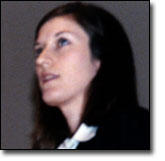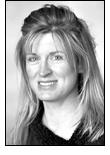
President George W. Bush has called his Supreme Court nominee, Harriet Miers, "the best person I could find." If he truly believes that, no wonder he couldn't find any weapons of mass destruction in Iraq.
As has been widely reported, White House adviser Ed Gillespie suggested at a closed meeting that some of the conservative unease about Miers "has a whiff of sexism and a whiff of elitism." Mr. Gillespie, the Miers nomination has a whiff of cronyism and a whiff of political expediency. Many Republicans don't want a insider crony of whatever gender appointed to the Supreme Court, even if she would vote the way they would like.
At a moment when the party is reeling from indictments, investigations, bloated deficit spending, and the Katrina fallout, Bush dealt a heavy blow to his party's morale. Under
any objective evaluation, Miers is not the best nominee to be found. Nor is she the best woman nominee (a large number of female federal judges immediately come to mind), nor is she the best female nominee not sitting on a federal bench. If Bush wanted to limit his selection to a woman who is not a judge, the nominee had to be impeccably qualified.
Off-hand, I can name three solidly Republican non-judicial women lawyers who are better qualified. I'm sure there are many more. Not all of the following women are ready for such an appointment-- for one thing, two are
under age 40. Perhaps once Miers brings herself up to speed, she might surpass some of them. But at this moment, three trump Miers.
First of all, why are Miers' credentials relatively weak? She may have been the first woman to lead the Texas Bar Association, but that position likely reflects her
political skills rather than her legal prominence. Having served on the Dallas City Council, another fine accomplishment, she appears to be foremost a politician. Her area of legal expertise is in
corporate law, not constitutional or federal statutory law. And her
law school isn't ranked in the top 50.
Miers has been named as one of the top 50 most
powerful woman lawyers, but not one of the best
litigators. I do not know of any extensive legal scholarship she has written. Oh, and she gave large campaign contributions to Democrats until she began giving to Texas Republicans in the early 1990s. Miers clerked for a Texas federal
district court judge and achieved prominence in a Texas law firm. Her current position as White House counsel is the pinnacle of her career.
And this just in: Miers has
said that she won't belong to the Federalist Society or other "politically charged" groups. Miers's favorite organization, the American Bar Association, takes official political positions (liberal ones), the Federalist Society does not.
And now for the comparators:
1. Maureen MahoneyIt is difficult to understand why President Bush selected Miers over Maureen Mahoney. Mahon

ey is better qualified in every way, has been called a "female John Roberts," and the First President Bush even nominated her for a district court slot 14 years ago (Clinton was elected before she could be confirmed)! She is undeniably a Republican (she was on the Bush II transition team), and the only major snag is that she
won the University of Michigan affirmative action case in the Supreme Court. Nina Totenberg has described Mahoney as "a very, very conservative woman Catholic."
Maureen Mahoney's credentials? In 1978, she
graduated from one of the top six law schools in the country with honors, the University of Chicago, and served on the University of Chicago Law Review. She
clerked for Justice William H. Rehnquist, as well as a Seventh Circuit judge. Like Roberts, she was one of Kenneth Starr's deputies when he was solicitor general for Bush I.
Ms. Mahoney argued her first case before the Supreme Court in 1988 and won the case in a 5-4 decision. The
American Lawyer reported that “her presentation was so well-schooled, poised, and disciplined that, according to one justice, the justices passed notes among themselves during the argument praising Mahoney and asking questions about her background." She has argued 13 cases before the nation's highest court.
Since 1993, Maureen Mahoney has been a partner in the Washington, D.C. office of Latham & Watkins, a prominent national law firm.
National Law Journal named her one of America's top 50 women litigators. Ms. Mahoney was appointed by then-Chief Justice Rehnquist to serve as the Chair of the Supreme Court Fellows Commission and as a member of the Advisory Committee on Appellate Rules to the United States Judicial Conference.
2. Rachel BrandOnly in her early 30's, Rachel Brand already has an accomplished career. Since July 2003, Brand has served as the
Principal Deputy Assistant Attorney General in the Office of

Legal Policy of the United States Department of Justice. In this position, she assists with the development and implementation of a variety of civil and criminal policy initiatives, the President’s judicial nominations, and the management of the Office. She focuses particularly on issues related to the war on terrorism.
Like Miers, Rachel previously served as an
Associate Counsel to the President. Before that, she worked at the boutique conservative constitutional litigation law firm Cooper, Carvin & Rosenthal. She
clerked for U.S. Supreme Court Justice Anthony Kennedy and Massachusetts Supreme Judicial Court Justice Charles Fried. Rachel received her J.D. from
Harvard Law School (usually ranked second out of more than 200 law schools), where she was
Deputy Editor-in-Chief of the Harvard Journal of Law and Public Policy. I'm pretty sure that Brand is a member of the Federalist Society.
Brand trumps Miers on law school ranking, clerk experience, conservative credentials, and legal expertise. Miers has about three times as much general legal experience, but Brand already has experience drafting Supreme Court opinions.
3. Wendy LongLong attended
one of the top ten law schools in the country, Northwestern University School of Law and served as Articles Editor of the Northwestern University Law Review. She
clerked for Justice Clarence Thomas (is anyone noticing a pattern here?) and Ralph K. Winter,

Circuit Judge, United States Court of Appeals for the Second Circuit.
Until 2005, Wendy Long was a
partner at one of the most prestigious firms in the country, Kirkland & Ellis, Kenneth Starr's former firm. She previously served as a press secretary in the U.S. Senate, for former U.S. Senator Bill Armstrong (R-Colo.) and former U.S. Senator Gordon Humphrey (R-N.H.). Currently, she is legal counsel to the Judicial Confirmation Network. Her Republican credentials are undeniable, as she has close ties to the Republican National Lawyers Association. She is in her early 40's.
Long trumps Miers on law school ranking, clerk experience, conservative credentials, law firm prestige, and legal expertise. Miers has about twice as much general legal experience and probably more litigation experience.
Here's one more: Brigida BenitezBush wanted to appoint a woman, and he also wanted to appoint a Hispanic. But he couldn't have his Kate and Edith too, right? Wrong.
Brigida Benitez is a
partner at the prestigious law firm of Wilmer Cutler Pickering Hale and Dorr LLP. She is the longest shot of the group, having graduated from "only"
Boston College School of Law (26th), ranked within shouting distance of my alma mater. But she was Editor-in-Chief of its Law Review. Unlike the other three comparators, she did not clerk for a Supreme Court Justice.

Benitez has
won high-profile cases and led complex civil litigation, arbitration and investigation matters. She has represented clients across the country in federal district court and circuit courts of appeal, as well as the United States Supreme Court. Her clients include CitiGroup, Sears Roebuck & Co. and Fannie Mae. She successfully second-chaired (here's that case again) the University of Michigan case before the United States Supreme Court.
She has served as President of the Hispanic Bar Association of the District of Columbia. Her Republican credentials are impeccable, given her key involvement with the Republican National Lawyers Association and membership in the Federalist Society.
Miers is more qualified than Benitez, but not by much. Miers has more overall experience and gravitas, but if I was a client with an important case before the Supreme Court, I'd probably hire Benitez and her firm first. Benitez went to a better law school and has paid her Republican dues from the beginning. She also is an independent thinker, willing to buck her Federalist Society colleagues on the affirmative action issue. Then again, perhaps the same could be said of Miers and the gay rights issue, although she was a Democrat at the time. Benitez is a woman in her 30's with experience comparable to 60-year-old Miers. The two things that set Miers apart other than her far longer legal service, is that she has been elected to a local office and been primary counsel to the President.
Bush stretched too far with the Miers nomination. He either should have chosen one of the women named above (or someone comparable), or named one of the many women with conservative credentials currently serving as appellate judges.
The Miers appointment reveals once again a President who really is not a true-believer conservative. He does not believe in limited government. He doesn't seem to understand what is at stake with this Supreme Court nomination-- like the Democrats, he must think that the abortion issue is all that matters. Too often, he has placed political gain over principle.
If confirmed, the very competent Harriet Miers will probably rise to the occasion. Perhaps she will formulate a judicial philosophy that rests on neutral principles rather than crass political calculations. If so, given the impetus behind her nomination, that would be ironic.
 When Miers bowed out, there was a collective sigh of relief among conservatives and liberals alike. Everyone is awaiting the next pick. And CNN is spinning (click on the chart above for a larger view):
When Miers bowed out, there was a collective sigh of relief among conservatives and liberals alike. Everyone is awaiting the next pick. And CNN is spinning (click on the chart above for a larger view):








